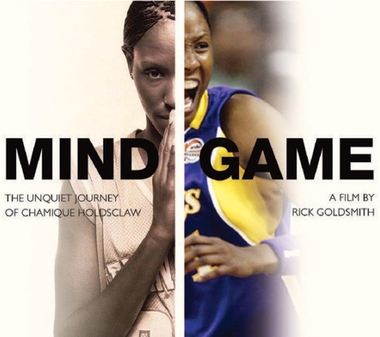MIND/GAME: The Unquiet Journey of Chamique Holdsclaw

by Robin Dorner
Editor in Chief
“Winning those games and winning those championships, man it was like the best feeling. Like, on earth. I mean I felt like a rock star! I’m not going to lie. I was like, on top of the world.
That’s Chamique Holdsclaw. In the 90’s she was coined “the female Michael Jordan.” But part of what made Holdsclaw a champion and gave her that drive would also threaten her life. That threat is mental illness.
“As a high school player, she was head and shoulders above everybody else,” said William C. Rhoden, Sportswriter for The New York Times. “By 1994 she was the talk of [High School Basketball] New York City. She was playing with the guys and beating the guys and by the time she was a senior, the legend had been set.”
Holdsclaw was a star basketball player in High School, at the University of Tennessee, then went on to play in the WNBA. While at Tennessee, she was the first woman to be an ESPN “Player of the Week.”
In an interview with The Gayly, Holdsclaw reflects on her mental illness – bipolar disorder – and said this about that drive: “I realize now chasing that high was something that fed me. I wanted that high; that level of elation. That was me operating in my bipolar state.”
Bipolar disorder, also known as manic depression, causes extreme mood shifts, often damages relationships and can lead to suicide.
“Basketball became like my coping mechanism and I had all this anger and frustration inside. Basketball took me to another place. It just was a release for me. It was like my therapist.”
It’s rare when athletes publically admit vulnerability. What mental health is about is seeking help, being vulnerable, talking about your issues. Holdsclaw tells all in a documentary in May on Logo TV.
“I had extreme highs and lows,” adds Holdsclaw. “I was either the life of the party or there were days I would isolate myself; I wanted to go through a whole practice on the basketball team without talking to anyone.”
Holdsclaw has a family history of mental illness. She was first diagnosed with clinical depression.
“I have often said that [I was misdiagnosed]. When I thought of what I was dealing with and I broke it down and I took the meds I realized this is what it was the whole time.
“You think it [diagnosis] would have been brought to the forefront earlier and at first I was really angry, but it wasn’t like I didn’t have access to the best doctors. I think it’s the human body and there is a lot of trial and error. I had to get past the stage I was angry – it was part of my journey.”
Holdsclaw and leaders like her know they have to put themselves out there and tell their stories to decrease the stigma of mental illness.
Her story offers a revealing look at the stigmas associated with mental illness, particularly in the sports world and in the African American community where preconceptions about mental health issues make it difficult for people to even acknowledge their struggle.
“It’s important to change the conversation. It can’t be something that’s taboo anymore,” Holdsclaw said in closing.
MIND/GAME: The Unquiet Journey of Chamique Holdsclaw is a documentary is done by two-time Academy-Award nominated filmmaker Rick Goldsmith. It premiers on the Logo channel May 3 at 8 p.m. CDT. To watch the trailer, visit logotv.com.
The Gayly – May 2, 2016 @ 11 a.m.





